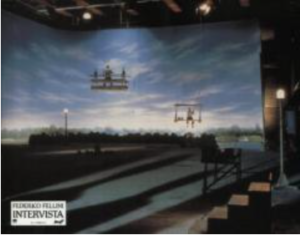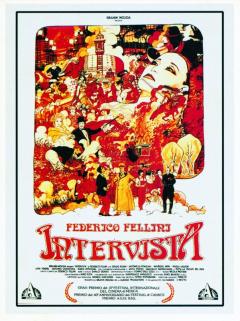Intervista
Word sales: Academy
Viewed censorship: 82589 22/05/1987
Fellini is shooting at Cinecittà a film based on America, the novel by Kafka. Pressed by questions from Japanese journalists, the director recounts his first visit, in 1940, to the Roman studios; he was also a journalist, in his early days, who came to Cinecittà to interview a famous diva. Fellini’s memories (hierarchies in orbace, the blue tranvetto for Cinecittà that crosses the Roman countryside, the imperial elephants, the Indians, etc.) crowd and intertwine with the questions of his frenetic interviewers, who film everything. Here is the young Fellini who finally interviews the diva, and meanwhile his current assistant director is looking for new faces in the subway. Then the police arrive, warned by a phone call of the presence of a bomb; then Marcello Mastroianni enters the scene wearing Mandrake’s tails. And the magic wand of these will make the images of La Dolce Vita appear, between the applause of those present and the tears of Anita Ekberg. The next day America resumed shooting, but a hurricane interrupted the shooting. A band of Indians attacked Cinecittà with TV antennas as spears. The filming of the film ends, and everyone greets each other wishing Merry Christmas.


Crew
Director: Federico Fellini
Subject: Federico Fellini
Screenplay: Federico Fellini
Photography: Tonino Delli Colli (Eastmancolor – Dolby Stereo)
Music: Nicola Piovani with a tribute to Nino Rota
Sound: Dolby Spectar Recording
Stage design: Danilo Donati
Costumes design: Danilo Donati
Editing: Nino Baragli
Assistant director: Daniela Barbiani, Filippo Ascione
Assistant director: Fiammetta Profili
Secretary of edition: Norma Giacchero
Dubbing director: Carlo Baccarini
Sound effects: Luciano Anzelotti, Massimo Anzelotti
Mixage sound engineer: Romano Pampaloni
General organization: Gino Milozza
Production Director: Roberto Mannoni
Producer Esecutiv: Pietro Notarianni
Manufacturer: Ibrahim Moussa
Production inspector: Michele Janczreck
Editing: Lillo Capoano
RAI Production Delegate: Silvio Specchio
Production secretary: Mario Mearelli
Cast
Federico Fellini: himself
Sergio Rubini: the journalist
Paola Liguori: the diva
Maurizio Mein: assistant director
Nadia Ottaviani : the vestal
Lara Wendel: the bride
Antonella Ponziani: the girl
Pietro Notarianni: the fascist hierarch
Anita Ekberg: herself
Marcello Mastroianni: himself
Maria Teresa Battaglia
Antonio Cantafora
Roberta Carlucci
Ettore Geri
Eva Grimaldi
Armando Marra
Leonello Pio Di Savoia
Gemana Dominici
Adriana Facchetti
Mario Miyakawa
Patrizia Sacchi
Antonello Zanini: the “Chiodo” and all the film crew
Awards
1987
Festival de Cannes: Special prize for the 40th anniversary to Federico Fellini for the film and the ensemble of his work
1987
Grand Prix – Gold Trophy at Moscow Festival
1988
César nominated for best film
Peculiarites
“I’ll never tire of thanking Ekberg and especially admiring her. She’s witty, wise, humble. The grace and willingness with which he agreed to reappear in Intervista, in contrast to the glorious image of La dolce vita, moved me. For the occasion, Marcello and I went to visit her in her house in the Castelli Romani, where she lives as a rural deity, serene, quiet, imperturbable, without the course of the years disturbing her in the slightest. We then remembered the experience of La dolce vita. I may have been a little cruel to her, but it was not my intention”.
(Fellini. Telling of me, conversations with Costanzo Costantini, Editori Riuniti, Rome, 1996, p. 199)
Reviews
A second reading of the film confirms our impression of Cannes. Interview is the singular fruit of a conscientious Fellini who, because of the black mood that has long accompanied him (justified by the growth of the years and the resentment towards the TV with which he is forced to live), either for the fringing of the creative breath, traces the many funny and painful ideas of his mythology and jokes about to exorcise the blackmail, identifying with a Cinecittà never so fully evoked as a factory of charlatans and poetry.
(Giovanni Grazzini “Corriere della sera”, 2 October 1987)
It has been said that Interview is Otto e mezzo with Fellini in person instead of Mastroianni, so many less sentimental messes, so much more wisdom. But it is the wisdom of an old clown, now able to “smile at life and all its contents” (to say it with the words of another emulator of Charlot, Zeno Cosini). Federico smiles at the diligence with which the Japanese commit themselves to steal the last truth; he smiles at the edge of the tear on the aging (beautiful exaggerated post) of Marcello Mastroianni and Anita Ekberg compared to their charismatic images in La dolce vita, smiles at the incidents that punctuate the making of the film. But underneath, he also smiles at us who take all these fantasies of his for absolute truth. Interview is the page of an apocryphal diary full of real feelings: the feeling of the changing time, the threat of an barbaric future (television equal assault of Indians), the indecipherability of a bleak past (fascism and its cinema) or mythologized (the youth).
(“Tullio Kezich La Repubblica”, 2 October 1987)
Interview is a superb film lesson. It is in all senses: for the masterful use of the expressive means of cinema, but also for what cinema is, as such (in its making, in its planning, as a sediment of memory and also as “death at work”). Cinema in its making because those who do it, as we said, as constantly behind and in front of the camera; cinema in its planning itself, because Fellini thinks and makes the auditions for a hypothetical future film inspired by America by Kafka; cinema as a sediment of memory, since Fellini relives the deliberately fantastic and lying key the first time he went as a journalist to Cinecittà; cinema as “death at work”, because, never as here, precisely in the dazzling, but also heartbreaking, reunion of Fellini and Mastroianni with Ekberg, the “Anitona” of La dolce vita, you experience on a physical level the truth of the old saying, attributed to Cocteau.
(Callisto Cosulich “Evening Country”, 2 October 1987)
To understand and love Interview, and understand its limits as it suits, it is enough to know its productive genesis: born as a television program, it has become a TV-movie and, finally, a film-film for cinemas, as if Fellini had grown in his hands. It’s a little movie, in a way, but what grace and grace and panache. Of course you can say, you’ve seen it before. But it’s also ungenerous to say when you think of the pleasure it gives. It can only be said who has not known, or wanted, to abandon himself to his festive rhythm, to his nature of film that grows on himself as if by parthenogenesis, to the alternation of melancholy and joy, of disarmed sincerity and impudent play of prestidigitation, to the wisely organized disorder, to its harmonious serenity even if slightly sad, that of a filmmaker who no longer needs to demonstrate his talent or to justify his fruitful contradictions.
“Morando Morandini Il Giorno”, 6 October 1987)


